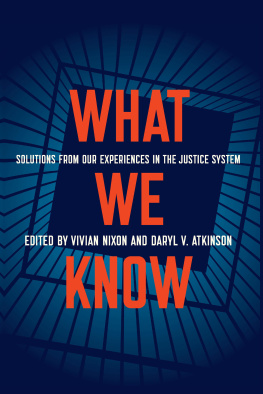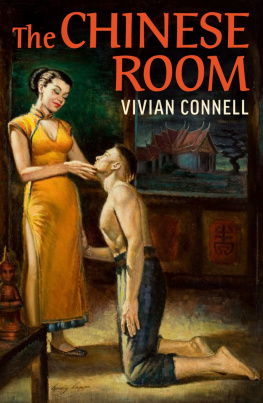Vivian Nixon (editor) - What We Know: Solutions from Our Experiences in the Justice System
Here you can read online Vivian Nixon (editor) - What We Know: Solutions from Our Experiences in the Justice System full text of the book (entire story) in english for free. Download pdf and epub, get meaning, cover and reviews about this ebook. year: 2020, publisher: The New Press, genre: Politics. Description of the work, (preface) as well as reviews are available. Best literature library LitArk.com created for fans of good reading and offers a wide selection of genres:
Romance novel
Science fiction
Adventure
Detective
Science
History
Home and family
Prose
Art
Politics
Computer
Non-fiction
Religion
Business
Children
Humor
Choose a favorite category and find really read worthwhile books. Enjoy immersion in the world of imagination, feel the emotions of the characters or learn something new for yourself, make an fascinating discovery.
- Book:What We Know: Solutions from Our Experiences in the Justice System
- Author:
- Publisher:The New Press
- Genre:
- Year:2020
- Rating:5 / 5
- Favourites:Add to favourites
- Your mark:
- 100
- 1
- 2
- 3
- 4
- 5
What We Know: Solutions from Our Experiences in the Justice System: summary, description and annotation
We offer to read an annotation, description, summary or preface (depends on what the author of the book "What We Know: Solutions from Our Experiences in the Justice System" wrote himself). If you haven't found the necessary information about the book — write in the comments, we will try to find it.
What We Know: Solutions from Our Experiences in the Justice System — read online for free the complete book (whole text) full work
Below is the text of the book, divided by pages. System saving the place of the last page read, allows you to conveniently read the book "What We Know: Solutions from Our Experiences in the Justice System" online for free, without having to search again every time where you left off. Put a bookmark, and you can go to the page where you finished reading at any time.
Font size:
Interval:
Bookmark:

WHAT WE KNOW
WHAT WE KNOW
SOLUTIONS FROM OUR EXPERIENCES IN THE JUSTICE SYSTEM
EDITED BY
VIVIAN NIXON AND DARYL V. ATKINSON

Contents
Kevin E. Jackmon
Thomas Bartlett Whitaker
Teresa Y. Hodge
Ty Evans
Aaron Striz
Corey Al-Ameen Patterson
C.T. Mexica
Daniel S. Throop
Khalil A. Cumberbatch
Jeremiah Paul Cahours
Terah Lawyer
Reginald Manning
Mikail DeVeaux, PhD
Mathew Lucas Ayotte
Michelle Jones
Sreedhar Potarazu, MD
Chris Dankovich
Charles Patrick Norman
Shirley Anne McCulley
Lewis Conway Jr.
Arthur Longworth
Bob Pelshaw
DeAnna Hoskins
Introduction
Vivian Nixon and Daryl V. Atkinson
Far too many people can rattle off the numbers describing the problems of the criminal legal system with startling ease: It is easy to take these numbers at face value and read past them without acknowledging the human meaning behind them. The statistics come across as sterile and impersonal. But for us, this problem is deeply personal.
We each spent more than three years in prison. We each had our experience coming face-to-face with the reality that people in poverty, people of color, and those without access to education and opportunity are grossly overrepresented in the criminal legal system. And, unlike many of the men and women we were incarcerated with, we both had support systems to welcome us home. Whether it was a family to provide us with the most immediate needs of food, shelter, and clothing, or an organizational support system like College and Community Fellowship, we both had the opportunity to pursue a higher education upon release. We earned our degreesone in law, the other in nonprofit management followed by an MFAand have since dedicated our careers to advocating for justice reform. We served our sentences and we came home with a deep understanding, not just of the failures of the criminal legal system, but also the infinite potential of the people who are relegated to our countrys prisons and jails.
Most Americans agree that the criminal legal system must be transformed if it is to become a system of justice. But only a select group of people have been invited to the table to imagine innovative solutions. People with conviction histories are barred from access to education and employment, and in many states are denied the right to vote. Basic tools that are necessary to advocate for oneself are out of reach for most people who have been involved in the criminal legal system. The designation criminal justice reform expert has been narrowly attributed to academics and practitionersthe lawyers, judges, police, and politicians. But those perspectives often see only one side of this complex problem. To our detriment, we as a country have largely failed to recognize the expertise and potential of incarcerated people and people with conviction histories.
That is why, since coming home, weve dedicated our careers not just to fixing the system but to amplifying the voices of those who are closest to the problem. Now, one of us leads the very same organization that was there in a time of need, College and Community Fellowship, which helps women who have been affected by the criminal legal system to earn their college degrees so that they, their families, and their communities can thrive. The other runs Forward Justice, which advances racial, social, and economic justice by partnering with human rights organizations at the forefront of social movements in the U.S. South. Together, we serve on the steering committee of the Formerly Incarcerated, Convicted Peoples and Family Movementa network of over fifty civil and human rights organizations that are led by people living with criminal records and their family members.
We believe that directly impacted people can bring the solutions to that transformation we seek. The voices of currently and formerly incarcerated people are so much more than the traumas weve experienced. Those who have not been directly impacted should respect our expertise, listen to what we have to say, and take the opportunity to step back and allow us to lead a movement for change.
Justice-involved people have been the source of many policy ideas that are now considered central tenets of criminal justice reform, but our contributions have often gone unrecognized. Ban the Box, for example, the campaign to remove the check box that asks a job candidate about their conviction history, was developed by a coalition of formerly incarcerated people who had experienced discrimination in hiring and struggled to get jobs; since the movement began in 2003, over 150 cities and the majority of states have implemented Ban the Box policies.
The essays in this book offer ideas to change policy and practice in the criminal legal system. All the authors are currently or formerly incarcerated. Some suggest bold sweeping transformations, and others aim to change a specific practice that is centered in the authors experience. They are compiled from an open call for submissions to writers inside and outside of prisons and jails. The only requirements were that authors be currently or formerly incarcerated and that they propose a policy solution connected to their direct experience with the justice system. In just four months we received over three hundred essays from thirty-five states across the country. We handpicked the twenty-three pieces collected hereconcrete solutions to some of the hardest and ugliest problems in the criminal legal system.
In this book you hear from a man, currently incarcerated in Indiana, who proposes a Prison Labor Standards Act, calling for an end to prison slave labor and a greater respect for the dignity of incarcerated workers. You also hear from a Nebraska man who served a federal prison term for white-collar crimes, and now has a proposal for offering courses in entrepreneurship as a way to break down barriers to employment for people returning from incarceration. A formerly incarcerated woman who now leads a nationally prominent justice reform organization pleads for greater empathy in understanding the human dignity of justice-involved individuals. And a man serving a twenty-five-year term for a crime he committed at age fifteen powerfully advocates for getting rid of existing financial incentives to charge youths as adults. These and the other essays in this volume lay bare the truth of how deeply flawed our current system is. And each essay uses the authors personal story to draw a line to a policy solution that would bring a degree of dignity, fairness, and actual justice to this nations criminal legal system. We acknowledge that some of the authors included here have caused harm to others, but the underlying foundation of this work is that those actions do not negate their expertise and ability to develop sound and profoundly necessary policy recommendations.
We, the editors of this book, do not necessarily agree with every aspect of every reform suggested in these pagesoften, we do not feel they go far enough. For instance, Aaron Striz in chapter 5 advocates for a 20/20 plan, making parole a possibility for people who were incarcerated in their teens and have completed twenty or more years in prisonwe think that a twenty-year sentence for a teen is excessive and out of step with the rest of the world; we would not want to see that become an acceptable minimum before parole is considered. Likewise, in chapter 16, Sreedhar Potarazu advocates for more basic literacy instruction in prison, which we endorse, but also suggests adding illiteracy as a factor to be considered in risk assessments, which we do not endorse. We were struck by the very modest nature of some of the proposed reforms, which seem to speak to a disturbing acceptance of a disproportionately punitive system. And we were surprised and disheartened not to receive any submissions calling for the complete abolition of prisons and detention centers, though this may have been a function of the way we worded our initial request for proposalsincluding the idea that we hoped for new reform ideas not currently in circulation. All of that said, our approach was not to solicit pieces with particular arguments, but to defer to the contributors in proposing their reforms and to practice what the book preaches about listening to and respecting the wisdom of those who know.
Next pageFont size:
Interval:
Bookmark:
Similar books «What We Know: Solutions from Our Experiences in the Justice System»
Look at similar books to What We Know: Solutions from Our Experiences in the Justice System. We have selected literature similar in name and meaning in the hope of providing readers with more options to find new, interesting, not yet read works.
Discussion, reviews of the book What We Know: Solutions from Our Experiences in the Justice System and just readers' own opinions. Leave your comments, write what you think about the work, its meaning or the main characters. Specify what exactly you liked and what you didn't like, and why you think so.










